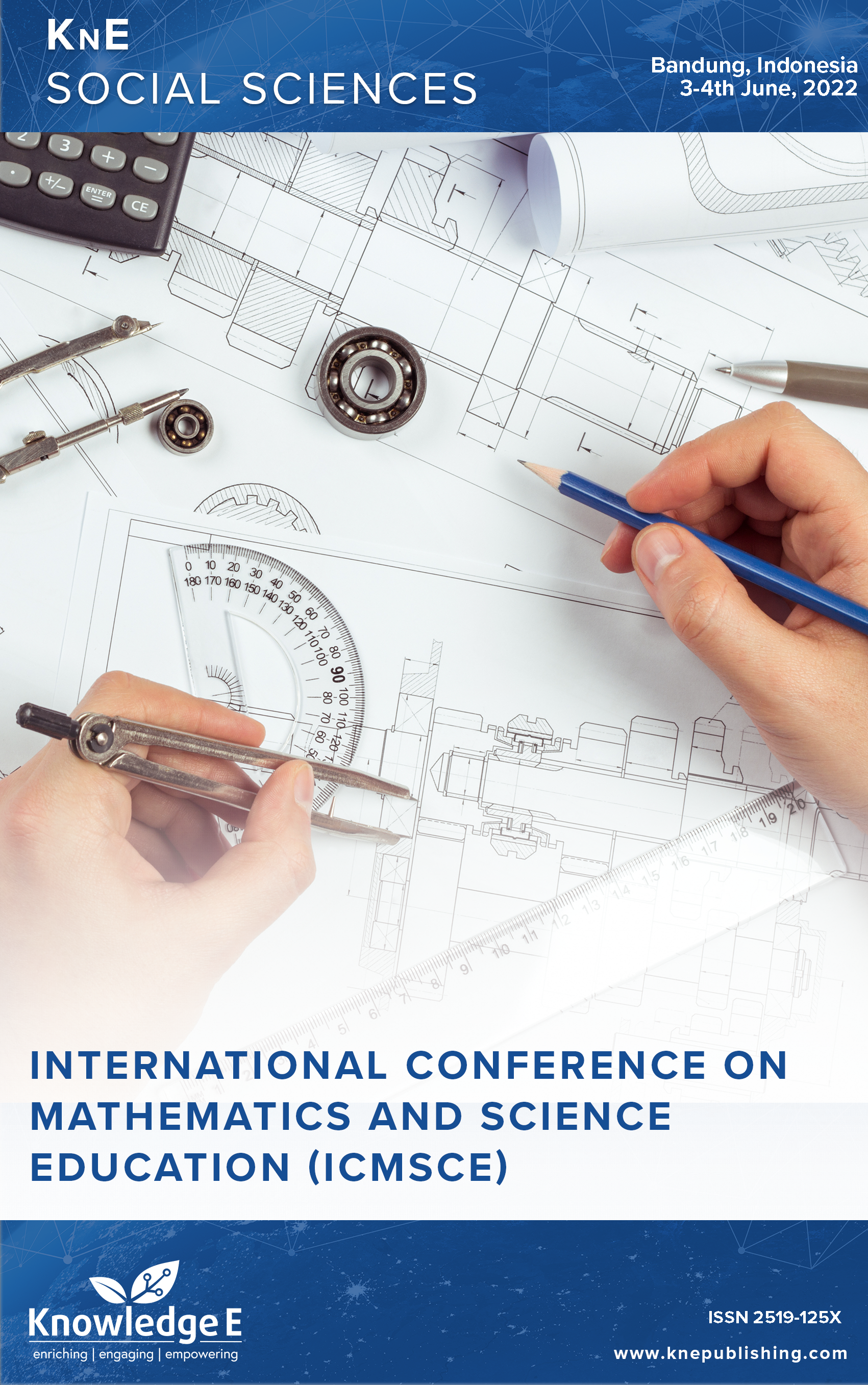How Much Do Elementary School Students Know About Climate Change? A Report from Java's Primary School Students
DOI:
https://doi.org/10.18502/kss.v9i13.15930Abstract
Climate change is a global issue that must be immediately responded to by the community. Responding to climate change requires awareness of climate change issues, from symptoms to impacts. Due to its complexity, the issue of climate change needs to be realized and understood by all levels of society, including elementary school students. This study aimed to describe the knowledge of elementary school students related to climate change. The method used was descriptive quantitative. The instrument used was a questionnaire using a Likert scale (1-4). A total of 1,410 elementary school students in grades 4-6 from several regions on the Island of Java participated in filling out a questionnaire distributed online. Knowledge data related to climate change were analyzed descriptively. The findings showed that, on average, students had limited knowledge and misconceptions about climate change. Minimal knowledge was shown about the causes, symptoms, effects, and efforts to mitigate and adapt to climate change. The implications of the research findings suggest the importance of explicit learning related to climate change starting at the elementary school level.
Keywords: Climate Change, Elementary School Students, Java’s
References
Fowler WC, Ting JM, Meng S, Li L, Tirrell MV. Integrating systems thinking into teaching emerging technologies. J Chem Educ. 2019;96(12):2805–13. DOI: https://doi.org/10.1021/acs.jchemed.9b00280
Mambrey S, Timm J, Landskron JJ, Schmiemann P. The impact of system specifics on systems thinking. J Res Sci Teach. 2020;57(10):1632–51. DOI: https://doi.org/10.1002/tea.21649
Tripto J, Assaraf OB, Amit M. Recurring patterns in the development of high school biology students’ system thinking over time. Instr Sci. 2018;46(5):639–80. DOI: https://doi.org/10.1007/s11251-018-9447-3
Herman BC, Feldman A, Vernaza-Hernandez V. Florida and Puerto Rico secondary science teachers’ knowledge and teaching of climate change science. Int J Sci Math Educ. 2017;15(3):451–71. DOI: https://doi.org/10.1007/s10763-015-9706-6
Sharma A. Global climate change: what has science education got to do with it? Sci Educ. 2012;21(1):33–53. DOI: https://doi.org/10.1007/s11191-011-9372-1
Legates DR, Soon W, Briggs WM, Monckton of Brenchley C. Climate Consensus and ‘Misinformation’: A Rejoinder to Agnotology, Scientific Consensus, and the Teaching and Learning of Climate Change. Sci Educ. 2015;24(3):299–318. DOI: https://doi.org/10.1007/s11191-013-9647-9
Littrell MK, Tayne K, Okochi C, Leckey E, Gold AU, Lynds S. Student perspectives on climate change through place-based film making. Environ Educ Res. 2020;26(4):594–610. DOI: https://doi.org/10.1080/13504622.2020.1736516
Meiviana A, Sulistiowati DR, Soejachmoen MH. Bumi makin panas: Ancaman perubahan iklim di indonesia. Jakarta: Kementrian Lingkungan Hidup; 2003.
Bangay C, Blum N. Education responses to climate change and quality: two parts of the same agenda? Int J Educ Dev. 2010;30(4):359–68. DOI: https://doi.org/10.1016/j.ijedudev.2009.11.011
Plutzer E, Hannah AL. Teaching climate change in middle schools and high schools: investigating STEM education’s deficit model. Clim Change. 2018;149(3–4):305–17. DOI: https://doi.org/10.1007/s10584-018-2253-8
Anderson A. Climate change education for mitigation and adaptation. J Educ Sustain Dev. 2012;6(2):191–206. DOI: https://doi.org/10.1177/0973408212475199
Hestness E, Randy McGinnis J, Riedinger K, Marbach-Ad G. A study of teacher candidates’ experiences investigating global climate change within an elementary science methods course. J Sci Teach Educ. 2011;22(4):351–69. DOI: https://doi.org/10.1007/s10972-011-9234-3
Sinatra, Kardash CA, Taasoobshirazi G, Lombardi D. Promoting attitude change and expressed willingness to take action toward climate change in college students. Instr Sci. 2012;40(1):1–17. DOI: https://doi.org/10.1007/s11251-011-9166-5
Karwowski M, Gralewski J, Patston T, Cropley DH, Kaufman JC. The creative student in the eyes of a teacher: A cross-cultural study. Think Skills Creativity. 2020;35(February):100636. DOI: https://doi.org/10.1016/j.tsc.2020.100636
Hannah AL, Rhubart DC. Teacher perceptions of state standards and climate change pedagogy: opportunities and barriers for implementing consensus-informed instruction on climate change. Clim Change. 2020;158(3–4):377–92. DOI: https://doi.org/10.1007/s10584-019-02590-8
Seroussi, Rothschild N, Kurzbaum E, Yaffe Y, Hemo T. Teachers’ knowledge, beliefs, and attitudes about climate change. Int Educ Stud. 2019;12(8):33. DOI: https://doi.org/10.5539/ies.v12n8p33
Lombardi D, Brandt CB, Bickel ES, Burg C. Students’ evaluations about climate change. Int J Sci Educ. 2016;38(8):1392–414. DOI: https://doi.org/10.1080/09500693.2016.1193912
Papadimitriou V. Prospective primary teachers’ understanding of climate change, greenhouse effect, and ozone layer depletion. J Sci Educ Technol. 2004;13(2):299– 307. DOI: https://doi.org/10.1023/B:JOST.0000031268.72848.6d
Ratinen I, Viiri J, Lehesvuori S. Primary school student teachers’ understanding of climate change: comparing the results given by concept maps and communication analysis. Res Sci Educ. 2013;43(5):1801–23. DOI: https://doi.org/10.1007/s11165-012-9329-7
Tanyanyiwa VI. Indigenous knowledge systems and the teaching of climate change in Zimbabwean secondary schools. SAGE Open. 2019;9(4):215824401988514. DOI: https://doi.org/10.1177/2158244019885149
Shea NA, Mouza C, Drewes A. Climate change professional development: design, implementation, and initial outcomes on teacher learning, practice, and student beliefs. J Sci Teach Educ. 2016;27(3):235–58. DOI: https://doi.org/10.1007/s10972-016-9456-5
Gall MD, Gall JP, Borg WR. Applying educational research. Boston: Pearson Education; 2005.
Suter W. Introduction to educational research: a critical thinking approach. United States: SAGE Publications, Inc; 2012. DOI: https://doi.org/10.4135/9781483384443
Hiroki F. Questionnaire on climate change education. Graduate School of Education. Japan: Okayama University; 2020.
Akaygun S, Adadan E. Fostering senior primary school students’ understanding of climate change in an inquiry-based learning environment. Education 3-13. 2021;49(3):330–343. https://doi.org/10.1080/03004279.2020.1854961. DOI: https://doi.org/10.1080/03004279.2020.1854961
García Vinuesa A, Rui Mucova SA, Azeiteiro UM, Meira Cartea PÁ, Pereira M. Mozambican students’ knowledge and perceptions about climate change: an exploratory study in Pemba City. Int Res Geogr Environ Educ. 2022;31(1):5–21. DOI: https://doi.org/10.1080/10382046.2020.1863671
Benevento SV. Communicating climate change risk to children: A thematic analysis of children’s literature. Early Child Educ J. 2023;51(2):201–10. DOI: https://doi.org/10.1007/s10643-021-01294-y
Gkotzos D. Teaching children’s rights and climate change with the support of act for climate web-based learning environment. Prospects. 2017;47(1–2):133–47. DOI: https://doi.org/10.1007/s11125-018-9421-5
Ratinen I. Students’ knowledge of climate change, mitigation and adaptation in the context of constructive hope. Educ Sci (Basel). 2021;11(3):1–14. DOI: https://doi.org/10.3390/educsci11030103
Carman J, Zint M, Burkett E, Ibá nez I. The role of interest in climate change instruction. Sci Educ. 2021;105(2):309–52. DOI: https://doi.org/10.1002/sce.21610

